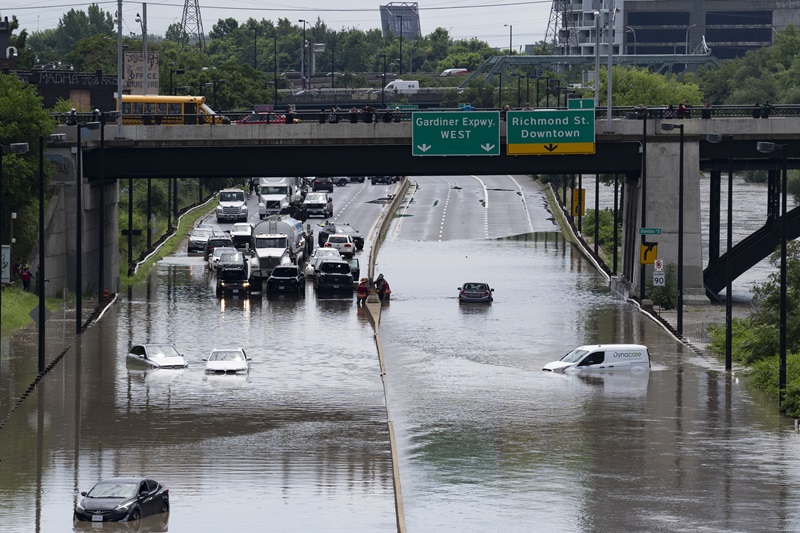Industry estimates price tag for Ontario’s July flooding

July flash flooding in Toronto and southern Ontario caused more than $940 million in insured damage, the Insurance Bureau of Canada (IBC) reports, citing initial estimates from Catastrophe Indices and Quantification Inc. (CatIQ).
“The insurance industry has long warned that severe weather events are becoming more frequent and intense. This summer is, unfortunately, proving that statement is correct,” said Amanda Dean, IBC’s vice president of Ontario and Atlantic regions.
“This summer, Canada’s insurers have been simultaneously supporting customers impacted by the Toronto floods, the Calgary hailstorm, the Jasper wildfire, and flooding across Quebec.
“The insurance industry is on the ground in Ontario, Alberta and Quebec, assisting customers as they put their lives back together. The emotional distress that these events have caused thousands of Canadians cannot be overlooked.”
Plus, property and casualty insurers are “in the early stages” of responding to flooding that occurred in Toronto and Montreal just this past weekend, IBC says. Environment Canada reported up to 80 mm of rain in southern Ontario over the weekend.
As part of the weather system, a confirmed EF1 tornado — which packed wind speeds of up to 165 km/h — felled trees, downed hydro lines, and damaged several business properties.
“The tornado tore large portions of the roof off [a Home Hardware store], tossed around watercrafts on large trailers at the business next door, and also left damage at the seed mill business across the street,” CityNews reports. “Photos from the Northern Tornadoes Project at the University of Western Ontario show empty train cars pushed off their rails, and a path of trees blown down, along with other damage.”
IBC reported “insurers will also be there for the customers impacted by the tornado that touched down in Ayr, Ontario, on the weekend.”
The climate-related catastrophic losses over the month are starting to pile up.
Morningstar DBRS has estimated wildfire damage that destroyed about one-third of the buildings in the town of Jasper, Alta., will likely be at least $700 million. No official estimates are in yet from the Calgary hailstorm or the Quebec floods, although industry sources are expecting claims counts for each to be in the neighbourhood of $1 billion.
All of this is putting strain on adjuster capacity, IBC notes.
“These simultaneous events have placed immense pressure on insurance adjuster resources for many insurers,” IBC says. “ IBC is working with governments and regulators across the country to address adjuster capacity across Canada. Adjuster access is critical following natural catastrophes, as they ensure the industry can support consumers as quickly as possible.”
And the P&C insurance industry capacity is not the only limiting factor in adjusting these claims, says Mitch Insurance’s service manager, Alex Gemmiti. He was responding to a Canadian Underwriter question about how Cat damage from Montreal’s flooding complicates claims response to the recent watermain break in the city.
He noted there are only so many contractors and restoration companies to go around, meaning it’s sometimes difficult for the insurance industry to obtain the personnel and equipment required to make the necessary repairs.
“With several large natural disasters in the span of one month, including another round of torrential downpours in the Greater Toronto Area over the weekend, coupled with skilled labour shortages and supply chain issues, we are urging affected customers to be patient,” says Craig Stewart, IBC’s vice president of climate change and federal issues. “Rebuilding will take time.
“IBC and its members are calling on governments to improve disaster preparedness and recovery across the country.”
Photo Credit: Cars are partially submerged in flood waters in the Don Valley following heavy rain in Toronto on July 16 2024. THE CANADIAN PRESS/Arlyn McAdorey







